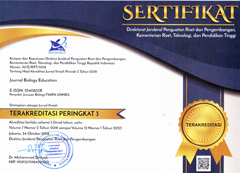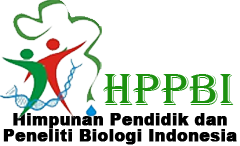The Ability of Biology Education Students in Arrange 2019 Revised Lesson Plan
Abstract
Lesson plans serve as guidelines for teachers when managing classes. However, some teachers choose to use the previous school year's lesson plans or copy their colleagues' lesson plans, this is due to the very detailed preparation of the 2013 curriculum lesson plans. This is the background for the Minister of Education and Culture to issue Letter Number 14 of 2019 concerning Simplification of lesson plan into three main components, namely learning objectives, learning activities, and assessment.. The purpose of this study was to analyze the ability of Biology Education Students in arrange the 2019 Revised lesson plan. The research method used was descriptive quantitative with survey techniques. The research sample was 50 UNNES Biology Education Students. Instruments in the form of lesson plan assessment sheets and student response questionnaires. The results obtained are the ability of Biology Students in general is included in the very good category by 14%, in the good category by 10%, in the average category by 44%, in the low category by 28%, and in the very low by 4%. Biology Education Students are mostly in the average category of 22 students. The total of students in the very good, good, and average categories is 34 students with a minimum score of 79,2. Most of the Biology Education Students in preparing the 2019 Revised lesson plan (34 students) have been able to compose the lesson plan components, especially the lesson plan identity components, learning objectives, selection of learning media, learning steps, assessment, and good language in preparing lesson plan. Although there are some students who have general deficiencies in the time allocation component that is not included in the learning scenario, learning resources that only use textbooks, lesson plans do not bring students closer to interacting with the environment, evaluations do not include remedial and enrichment programs, and assessment attachments are sometimes missed. The results of the student response questionnaires became crosscheck to determine the level of student knowledge .The result of learning objective percentage of 91.2%, an assessment of 90.8%, an evaluation of 89.2%, preparation and guidelines lesson plan 87.6%, learning steps 86.4%, basic knowledge about the differences between the 2013 Curriculum lesson plan and the 2019 Revised lesson plan 85.36%, knowledge about the advantages and disadvantages of lesson plan 84.13%. The concluision is most (34 students) Biology Education Students have been able to prepare the 2019 Revised lesson plan highest achievement is 99 and the lowest achievement is 68. The results of the student response questionnaire generally show that Biology Education students are good at understanding the arrange of the 2019 lesson plan.
The copyright of the article once it is accepted for publication shall be assigned to the journal as the publisher. The intended copyright includes the right to publish the article in various forms (including reprints). The journal maintains the publishing rights to the published articles.
This work is licensed under a Creative Commons Attribution 4.0 International License.







